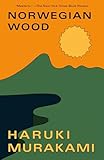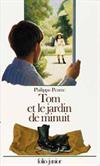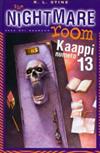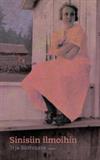
Norwegian Wood
Registered by tho on 1/6/2005
2 journalers for this copy...
To be read soon ...
From amazon:
In 1987, when Norwegian Wood was first published in Japan, it promptly sold more than 4 million copies and transformed Haruki Murakami into a pop-culture icon. The horrified author fled his native land for Europe and the United States, returning only in 1995, by which time the celebrity spotlight had found some fresher targets. And now he's finally authorized a translation for the English-speaking audience, turning to the estimable Jay Rubin, who did a fine job with his big-canvas production The Wind-Up Bird Chronicle. Readers of Murakami's later work will discover an affecting if atypical novel, and while the author himself has denied the book's autobiographical import--"If I had simply written the literal truth of my own life, the novel would have been no more than fifteen pages long"--it's hard not to read as at least a partial portrait of the artist as a young man.
Norwegian Wood is a simple coming-of-age tale, primarily set in 1969-70, when the author was attending university. The political upheavals and student strikes of the period form the novel's backdrop. But the focus here is the young Watanabe's love affairs, and the pain and pleasure and attendant losses of growing up. The collapse of a romance (and this is one among many!) leaves him in a metaphysical shambles:
I read Naoko's letter again and again, and each time I read it I would be filled with the same unbearable sadness I used to feel whenever Naoko stared into my eyes. I had no way to deal with it, no place I could take it to or hide it away. Like the wind passing over my body, it had neither shape nor weight, nor could I wrap myself in it.
This account of a young man's sentimental education sometimes reads like a cross between Sylvia Plath's The Bell Jar and Stephen Vizinczey's In Praise of Older Women. It is less complex and perhaps ultimately less satisfying than Murakami's other, more allegorical work. Still, Norwegian Wood captures the huge expectation of youth--and of this particular time in history--for the future and for the place of love in it. It is also a work saturated with sadness, an emotion that can sometimes cripple a novel but which here merely underscores its youthful poignancy(..)
From amazon:
In 1987, when Norwegian Wood was first published in Japan, it promptly sold more than 4 million copies and transformed Haruki Murakami into a pop-culture icon. The horrified author fled his native land for Europe and the United States, returning only in 1995, by which time the celebrity spotlight had found some fresher targets. And now he's finally authorized a translation for the English-speaking audience, turning to the estimable Jay Rubin, who did a fine job with his big-canvas production The Wind-Up Bird Chronicle. Readers of Murakami's later work will discover an affecting if atypical novel, and while the author himself has denied the book's autobiographical import--"If I had simply written the literal truth of my own life, the novel would have been no more than fifteen pages long"--it's hard not to read as at least a partial portrait of the artist as a young man.
Norwegian Wood is a simple coming-of-age tale, primarily set in 1969-70, when the author was attending university. The political upheavals and student strikes of the period form the novel's backdrop. But the focus here is the young Watanabe's love affairs, and the pain and pleasure and attendant losses of growing up. The collapse of a romance (and this is one among many!) leaves him in a metaphysical shambles:
I read Naoko's letter again and again, and each time I read it I would be filled with the same unbearable sadness I used to feel whenever Naoko stared into my eyes. I had no way to deal with it, no place I could take it to or hide it away. Like the wind passing over my body, it had neither shape nor weight, nor could I wrap myself in it.
This account of a young man's sentimental education sometimes reads like a cross between Sylvia Plath's The Bell Jar and Stephen Vizinczey's In Praise of Older Women. It is less complex and perhaps ultimately less satisfying than Murakami's other, more allegorical work. Still, Norwegian Wood captures the huge expectation of youth--and of this particular time in history--for the future and for the place of love in it. It is also a work saturated with sadness, an emotion that can sometimes cripple a novel but which here merely underscores its youthful poignancy(..)
Journal Entry 2 by cerejinha from Lisboa - City, Lisboa (cidade) Portugal on Friday, January 14, 2005
What a wonderful book! I don't know a thing about Japan, so I had no ideia what to expect of a story about a boy's coming-of-age in Tokyo in the end of the sixties. Watanabe is a very sweet character, the story of each character in the book is very well written and it made me cry in the end.
What I love about Murakami's novels is the way he can describe the most intimate feelings and emotions with such simplicity and detail ... his characters are always so real... I can almost picture Watanabe, Midori, Naoko and Reiko so vividly in my mind as if they were my best friends. I really enjoyed this book, it's something to be savoured slowly and quietly :-)
My favourite quote is from Midori, after she forgives Watanabe when he moves out of the dorm without letting her know:
"You're as honest as they come," said Midori. "I'm guessing, of course! Anyway, what's wrong with you?"
"I don't know. I'm trying to whip up a little enthusiasm."
"Just remember, life is a box of chocolates."
I shook my head a few times and looked at her. "Maybe I'm not so smart, but sometimes I don't know what on earth you're talking about."
"You know, they've got these chocolate assortments, and you like some but you don't like others? And you eat all the ones you like, and the only ones left are the ones you don't like as much? I always think about that when something painful comes up. "Now I just have to polish these off, and everything'll be OK.' Life is a box of chocolates."
"I suppose you could call it a philosophy."
"It's true, though. I've learned it from experience."
( ... I found an online version of the book here: http://www.cunshang.net/book/nor_en/1.htm)
My favourite quote is from Midori, after she forgives Watanabe when he moves out of the dorm without letting her know:
"You're as honest as they come," said Midori. "I'm guessing, of course! Anyway, what's wrong with you?"
"I don't know. I'm trying to whip up a little enthusiasm."
"Just remember, life is a box of chocolates."
I shook my head a few times and looked at her. "Maybe I'm not so smart, but sometimes I don't know what on earth you're talking about."
"You know, they've got these chocolate assortments, and you like some but you don't like others? And you eat all the ones you like, and the only ones left are the ones you don't like as much? I always think about that when something painful comes up. "Now I just have to polish these off, and everything'll be OK.' Life is a box of chocolates."
"I suppose you could call it a philosophy."
"It's true, though. I've learned it from experience."
( ... I found an online version of the book here: http://www.cunshang.net/book/nor_en/1.htm)
















